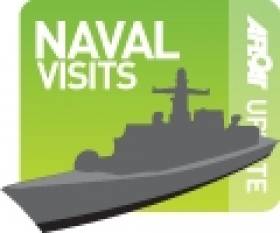Displaying items by tag: FGS Hessen
German Navy Task Force Calls to Capital
#GERMAN NAVY – Three German Navy vessels that forms a task force group docked in Dublin Port this morning for a weekend courtesy call, writes Jehan Ashmore.
Auxiliary tanker FGS Frankfurt Am Main (A1412) berthed in the heart of the port at Alexandra Quay West, close to the East-Link Toll-Lift Bridge. The 174m vessel which displaces over 20,000 tonnes will remain somewhat obscured from view during her port of call due to the surrounding dockland infrastructure.
The Berlin class replenishment vessel and her leadship sister FGS Berlin are the largest units in the German Navy. They not only carry fuel but also handle stores, military equipment, ammunition, medical services and can accommodate helicopters.
Footage above shows the task force departing Portsmouth from a vantage point taken from The Hard that leads into the Hampshire harbour.
Across Alexandra Basin lies the Sachsen class air-defence frigate FGS Hessen (F221) of 5,690 tonnes. The third member of the trio is the 130m Bremen class multi-purpose frigate FGS Emden (F210) of 3,680 tonnes which is moored at an adjacent berth alongside at Ocean Pier.
Unlike the auxiliary the frigates will be more visible from the south quays near the Poolbeg Yacht Boat Club marina at Ringsend.






























































